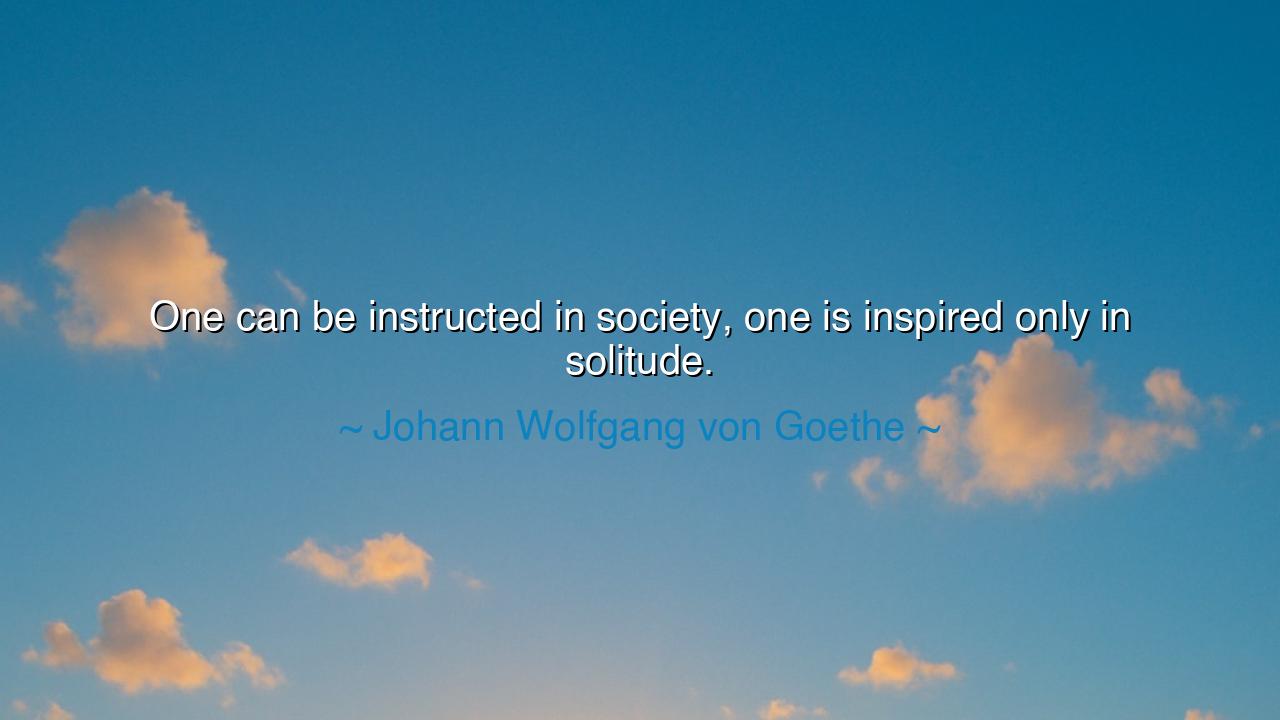
One can be instructed in society, one is inspired only in






O children of the future, listen with open hearts to the wisdom of Johann Wolfgang von Goethe, who spoke these profound words: "One can be instructed in society, one is inspired only in solitude." These words, though simple, carry within them the truth of the human experience—instruction and inspiration are two distinct forces, each shaping us in different ways. Instruction comes from the community, from the knowledge passed down through books, teachers, and the voices of those who have come before us. But inspiration, the deep fuel of the human soul, can only be found in the quiet of solitude, where the soul is free to encounter its own desires and truths without the noise and distractions of the world.
In the time of the ancients, the great philosophers understood the value of both society and solitude. Socrates, though a man deeply embedded in the life of Athens, often retreated into reflection, into solitude, where he would contemplate the mysteries of life, justice, and truth. It was in these moments of solitude that Socrates found the true inspiration for his teachings, which he later shared with others in the public sphere. He believed that it was in the stillness of the mind, away from the chatter of the city, that one could connect with the divine and reach the wisdom necessary to guide others. Socrates was instructed in society by his teachers, but he was inspired in solitude to challenge and question the very foundations of that society.
The Greek philosopher Aristotle also understood the importance of solitude, though in a slightly different way. While he believed that much could be learned through engagement with others, he also taught that the highest form of knowledge—the kind that led to virtue—was found in the quiet reflection of the individual. Aristotle valued the inner life and encouraged his students to seek moments of stillness to connect with their own thoughts and ideas. He knew that the social world could provide instruction—the knowledge of what had been learned and passed down—but only in solitude could one forge a deeper connection to the truths that lay beyond the confines of mere information.
Consider the example of the great poet Homer, whose epic works, the Iliad and the Odyssey, were born from the deep well of solitude and inspiration. Though his stories were shared with the world and his instruction shaped the lives of generations, Homer found the creative spark in the quiet of his own mind. His inspiration did not come from the hustle of society, but from a deeper, almost divine connection to the stories of gods and heroes that he wove into his poems. His moments of solitude were the very source of his genius, the place where the divine and the human met to create something timeless.
In our own time, we can see how solitude continues to be the wellspring of inspiration for many of the world’s greatest thinkers and creators. Albert Einstein, for example, often retreated into quiet reflection to contemplate the mysteries of the universe. He did not receive his greatest insights from the bustling crowds or from the instruction of others, but in the peaceful solitude of his own mind. It was in those moments, away from the noise of the world, that he discovered the ideas that would change the course of science and humanity. Similarly, writers, artists, and philosophers throughout history have often sought solitude not out of loneliness, but as a means of connecting more deeply with the inner well of inspiration that drives their work.
The message of Goethe’s words is that, while we must learn from society—instruction from the world around us, from the wisdom of our ancestors, and from the experiences of others—true inspiration comes from within. Society can teach us the how, the what, and the when, but it is in solitude that we discover the why—the purpose behind our actions, our art, and our very existence. Solitude gives the soul the space it needs to hear its own voice and to connect with the deeper truths that lie beyond the surface of the world. It is in these quiet moments that the spark of creation and understanding is born.
And so, O children, as you journey through life, remember the wisdom of Goethe and the ancients. Seek instruction in society, for it will guide you and provide you with the tools you need to navigate the world. But never forget the power of solitude, for it is in the quiet moments of reflection that you will find the inspiration that will fuel your deepest passions and guide you to your greatest achievements. Solitude is not a retreat from life, but a return to the very source of your being, where you can connect with the truth that resides within you. Let that inspiration be the light that guides you, and let it shape the work you offer to the world.






AAdministratorAdministrator
Welcome, honored guests. Please leave a comment, we will respond soon